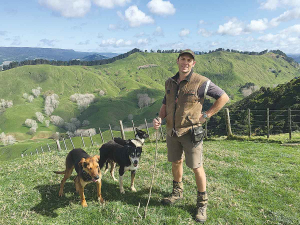Top wool advocate bales out
The conversion of productive farmland into trees has pretty much annihilated the wool industry.
 New Wools of NZ chair James Parsons acknowledges that wool prices were at an all-time low and unsustainable at current price levels.
New Wools of NZ chair James Parsons acknowledges that wool prices were at an all-time low and unsustainable at current price levels.
Northland sheep and beef farmer James Parsons doesn’t see himself as the white knight when it comes to fixing the wool sector.
In late June, Parsons was elected chair of WNZ, the marketing and export company owned by 700 sheep farmers.
Speaking to Rural News, Parsons acknowledged that wool prices were at an all-time low and unsustainable at current price levels.
“Like many farmers, I’m shocked at where things are. Out of a desire to see a vibrant wool sector I offered my services to shareholders in November last year,” he says.
Parsons says the WNZ board and management, led by new chief executive John McWhirter, are working on strategies to revitalise the returns for their shareholders.
One area WNZ are focused on is getting the NZ wool story to consumers.
“That authentic story is lost in the NZ strong wool commodity supply chain right now. It’s unrealistic to expect a grower’s story to pass from the grower to a merchant to a broker, through an auction, to an exporter to a spinner then a manufacturer, then a distributor to a retailer and finally a consumer.”
The WNZ model is to take its growers’ wool further along the supply chain through WNZ branded sales to its spinning and manufacturing partners.
“Of all NZ strong wool companies WNZ is one of the best placed, with international representatives and strong partnerships in market, to grow this branded supply and connect customers back to grower shareholders,” said Parsons.
Farmgate price for wool dropped to around $1.60/kg for clean wool; greasy or unscoured wool is attracting 20% less. Since the Covid-19 lockdown, prices dropped even further to around $1/kg mark.
At the moment these returns to farmers didn’t even come close to covering the costs of shearing and in some cases, it wasn’t even worth sending the wool off farm.
Parsons says some farmers are stockpiling wool in the hope prices will pick up but there are also farmers who are accepting the price and clearing wool stock.
He says the appointment of McWhirter is a great addition for WNZ. A former head of Hellers Limited, he brings experience in building supply chains, products, brands and developing strong consumer loyalty.
“The board recognised specific skills John had in turning primary produce into consumer goods. Strong wool prices have been through a period of decline for the last two decades and Covid-19 has seen prices crash to an all-time low,” says Parsons.
But Parsons says there is sign of renewed activity in the UK residential market.
“Typically, wool carpet is sought by high income earners and UK is returning to normal in term of domestic demand.”
Parsons also notes that Covid-19 hasn’t just picked on the wool sector, but also affected the synthetic carpet market and on a bigger scale.
While the North Island is inundated with rain, Southland is facing receding water levels as warm weather and lack of rainfall continues.
Organisers are expecting another full field of 40 of the country’s top shearers for the popular Speed Shearing event at this year’s Southern Field Days at Waimumu.
The Southern Field Days Innovation Awards have a great record in picking winners and the winner of the 2024 event will be putting up a display to support the event at this year’s show.
A buoyant farm economy should make for a successful 2026 Southern Field Days, says chairman Steve Henderson.
OPINION: November 7 has been set by Christopher Luxon as ‘E day’ – election day.
The strong wool market has improved in the past six months, despite drops in production over recent years.

OPINION: Your old mate has long dismissed the Greens as wooden bicycle enthusiasts with their heads in the clouds, but…
OPINION: After seven years of Adrian Orr’s antics as Reserve Bank NZ governor, the priority of his successor, Anna Breman,…